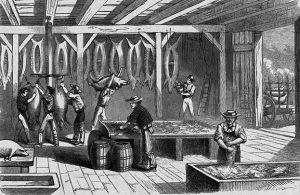“States’ rights” is back in vogue among American conservatives — including conservative evangelicals — as the cure to enact their preferred restrictive social policies. But few of those advocates are likely to be pleased with the results of a new USA TODAY/Ipsos poll on abortion.
That poll found Americans overwhelmingly favor allowing at least some access to abortion — by a margin of nearly 2-to-1. And Americans overwhelmingly would like to be able to vote on abortion measures in state elections, the poll found.
That flies in the face of the hopes of anti-abortion activists who cheered the U.S. Supreme Court decision that wiped out the federal right to abortion services guaranteed by a different Supreme Court 50 years earlier. The current court’s conservative supermajority said questions about abortion access should be returned “to the people and their elected representatives.”
Currently, with the federal protections gone, state legislatures controlled by Republicans are rushing to implement state-level bans on the procedure.
“Anti-abortion laws are being enacted by state legislatures, not by popular votes within those states.”
And there is the rub: Anti-abortion laws are being enacted by state legislatures, not by popular votes within those states. In nearly half the states, conservative Republicans control state legislatures in part through gerrymandering that makes state governments more conservative than the majority opinions held within the populace.
There are few states in America — although there are a few — that are so overwhelmingly conservative that the populace would embrace the conservative evangelical agenda wholesale, as some state legislatures have.
These disparities affect most of the key social issues of the day — from abortion to immigration to religious liberty to same-sex marriage to public education. While federal policies — and particularly federal court rulings — often have gone against the constraining wishes of conservative evangelicals, they have found state legislatures more welcoming to their cause.
Lindsay Graham and South Carolina
Thus, Sen. Lindsay Graham, Republican of South Carolina, went on CNN Aug. 7 to say states should decide whether two consenting adults of the same gender may be legally married. That’s settled federal law right now, but it is clear a few Supreme Court justices are itching for the opportunity to overturn that right using the same logic by which they overturned the right to abortion.
“I’ve been consistent,” Graham said on CNN. “I think states should decide the issue of marriage, and states should decide the issue of abortion. I have respect for South Carolina. South Carolina voters I trust to define marriage and deal with the issue of abortion. Not nine people on the court. That’s my view.”
What Graham surely means is that the South Carolina Legislature should determine this, not that it be put to a popular vote. Although no current state-specific polling data has been published on the same-sex marriage question, Gallup recently reported that nationwide 71% of Americans favor allowing same-sex marriage, a new high.
“New polling data are available that give a clear picture of what South Carolina voters think — and they are not in agreement with Lindsay Graham.”
On the issue of abortion access, however, new polling data are available that give a clear picture of what South Carolina voters think — and they are not in agreement with Lindsay Graham. While they may keep reelecting him to the Senate, if given a chance to vote separately on abortion, they would defy him.
Even now, South Carolina legislators are debating a bill that would ban all abortions in the state. But at the same time, nearly two-thirds of South Carolina adults told Public Policy Polling the first week of July that they want abortion to be legal and accessible in the state.
Nearly 70% believe the decision to have an abortion should be left to a woman and her doctor.
Only 8% of South Carolinians favor a total ban on abortions like the one currently on offer in the state legislature. And nearly all — 91% — believe doctors should be able to help patients experiencing pregnancy complications and miscarriages without fear of being prosecuted.
CNN host Dana Bash also asked Graham if the U.S. Supreme Court should give to states the determination of whether interracial marriages are allowed. Most Southern states — including South Carolina — had laws on the books prohibiting interracial marriage until the Supreme Court intervened on June 12, 1967. That decision, Loving v. Virginia, provided a federal right to interracial marriage that superseded any state prohibitions.
Although this determination was made by the court on the same basis as Roe v. Wade and later decisions on contraception and sex between adults of the same gender, it was not included in Justice Clarence Thomas’ list of court rulings he believes should be overturned for the same reasons as Roe. Thomas, a staunch conservative, happens to be a Black man married to a white woman.
“Before the court’s Loving decision, South Carolina had a ban on interracial marriage on its books since 1717. It was not vacated until three years after the Supreme Court ruling in Loving.”
Before the court’s Loving decision, South Carolina had a ban on interracial marriage on its books since 1717. It was not vacated until three years after the Supreme Court ruling in Loving.
So it was in this context that the CNN host asked Sen. Graham if the high court should also overturn Loving and return the question of interracial marriage to the states.
Graham blatantly dodged the question: “No, here’s the point. We’re talking about things that don’t happen because you don’t want to talk about inflation, you don’t want to talk about crime,” Graham said. “This is all politics, my friends. Instead of trying to solve problems, we’re talking about constitutional decisions that are still in effect. But if you’re going to ask me to have the federal government take over defining marriage, I’m going to say no.”
A brief history of states’ rights
“States’ rights” became a watchword of Southerners before, during and after the Civil War. By the account of some Southerners, the war itself was over the issue of states’ rights versus federal rights. In short, the Southern states wanted to maintain slavery and not be told by the federal government they could not.
One of the little-understood components of this fight involves the passage of the 14th Amendment to the U.S. Constitution and a set of obscure Supreme Court rulings less than a decade later.
The Fourteenth Amendment reads in Section 1:
All persons born or naturalized in the United States, and subject to the jurisdiction thereof, are citizens of the United States and of the state wherein they reside. No state shall make or enforce any law which shall abridge the privileges or immunities of citizens of the United States; nor shall any state deprive any person of life, liberty, or property, without due process of law; nor deny to any person within its jurisdiction the equal protection of the laws.
In short order, the 13th, 14th and 15th Amendments were added to the Constitution to change the racially discriminatory nature of American law after the Civil War. Slavery was abolished, citizenship at birth was guaranteed for all persons born or naturalized in the U.S, and the right to vote was guaranteed to all men (women did not get the right to vote until the 19th Amendment was ratified in 1920).
“Part of the narrative of the Southerners’ Lost Cause is that Abraham Lincoln and the U.S. Congress took away the rights of states to govern themselves — even if the way they chose to govern was blatantly racist.”
These post-war amendments — granting the federal government the ability to prevent states from discrimination against Black persons and former slaves in particular — have been a burr in the saddle of Southern conservatives for 175 years. Part of the narrative of the Southerners’ Lost Cause is that Abraham Lincoln and the U.S. Congress took away the rights of states to govern themselves — even if the way they chose to govern was blatantly racist.
And they have hammered away at their cause relentlessly ever since, although often not saying out loud what is the real motivation.
The Slaughterhouse cases
An important but little-noticed part of that story is the Slaughterhouse cases ruling by the U.S. Supreme Court in 1873. This involved two related cases where the high court ruled that a citizen’s “privileges and immunities,” as protected by the 14th Amendment, were limited to those spelled out in the Constitution and therefore did not include certain rights given by — or taken away by — individual states.
 This decision turned on the same kind of “originalism” logic favored by the current court’s conservative majority.
This decision turned on the same kind of “originalism” logic favored by the current court’s conservative majority.
The practical effect of the ruling was to allow the state of Louisiana to grant a business monopoly to Crescent City Livestock Landing and Slaughterhouse Company in New Orleans. That monopoly had been challenged by competitor slaughterhouses.
As the court’s first interpretation of the 14th Amendment, this ruling was about more than the business of processing beef. It allowed the court to scale back and temper the effects of the 14th Amendment.
And this is the same argument some modern-day conservatives make when they talk about “states’ rights.” The argument, which is as old as the republic itself, is about the balance of power between the nation and the states.
In the early days, states’ power always came from the landed gentry who were elected to public office and made decisions for “the people.” As today’s polling data suggest, there’s a good reason for those in power to favor gerrymandered congressional districts — that’s how they’re able to stay in power and pass legislation that never would get approved in a public referendum.
Abortion and same-sex marriage are about to put that power play to the test.
Related articles:
A leak: The truth of a sick nation | Opinion by Jamar A. Boyd
Racial history is American history | Opinion by Russell Waldrop
At home in the 17th century | Opinion by Bill Leonard


